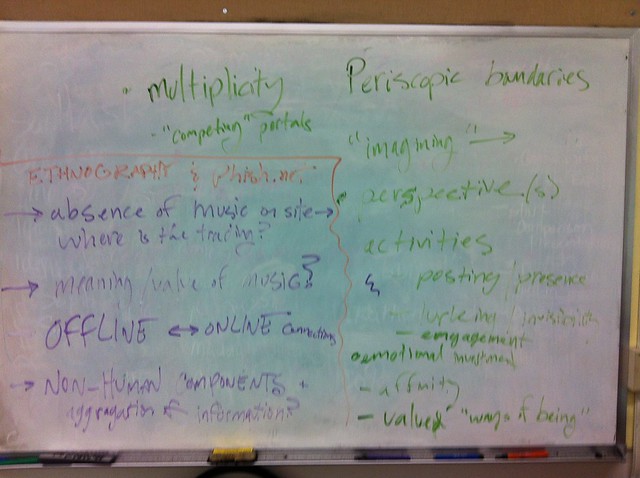Week 7 recap (for those not able to be in class…)
1May 16, 2012 by jfenn@uoregon.edu
Yesterday we explored the concept of “community” from multiple angles, drawing on themes, questions, and issues raised across the several “readings” connected to this week (in the Diigo group, as well as those listed here). The image above captures a slice of our wide-ranging conversation, with the green text representing key terms or “limits” of the idea of community when it comes to digital ethnography. By no means did we establish a firm definition or easily articulated delineation of what constitutes community, but that wasn’t the goal. Rather, I wanted us to reach back to the readings—which dealt with both online and offline spaces carved out by hackers, geeks, gay Catholics, former residents of Montserrat, car enthusiasts, and Phish fans—in order to tease out key components in identifying communities. We talked extensively about “activities” as that loose formulation of things people do in order to perform, enact, embody, or instantiate “community.” Eventually, we moved into a short exercise that involved taking a look at Phish.net as it is now and generating ethnographic projects/approaches that somehow involved the digital. These ideas are in the purple text on the whiteboard…
The first part of class featured a tool workshop by Ed Parker that dug into “social listening” using Twitter-focused tools. Here is his Prezi:
Category general info, Spr2012 | Tags: discussion, recap, resources, tools


Great recap! Thanks for posting this – it sounds like a rich discussion that will surely continue through the next few weeks. I love the idea of visiting Phish.net as it is now, especially in light of conversations about online communities in the past as either ghost towns (as Whitney put it) or nostalgically-painted communities of care.
Great prezi on twitter and social listening, Ed – very appropriate for a day on studying community! I’m on twitter, but I’ve never found a smooth way to use it for research. thanks for including the videos, as well. So many tools! I’m fascinated by the styles/ points of origin for these videos!
I’m also intrigued on the ways “social listening”and reputation management might be used to encourage “listening” to informants, fellow academics, and community members. Thinking about how listening has figured prominently in feminist methodologies, I wonder how to use these data-gathering technologies in conjunction with old-school ethic of care style qualitative work.